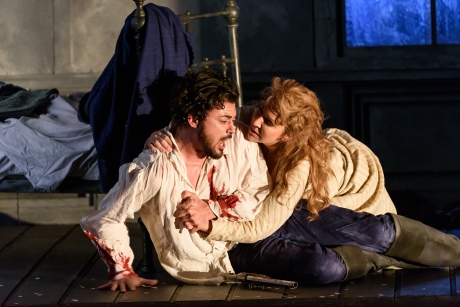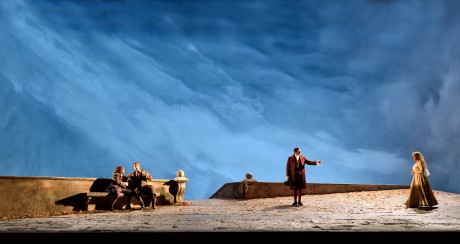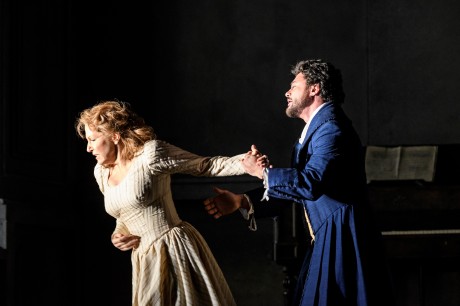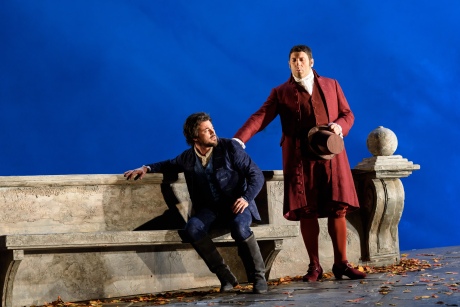There was a time when Massenet’s Werther was pretty much repertory-fodder at Covent Garden. Between 1979 – when it had only its second performance in the house since the catastrophic premiere in 1894 – and 1987, the Royal Opera gave the work in four different (and differently cast) runs, which brought us the Werthers of Alfredo Kraus and José Carreras, and the Charlottes of Frederica von Stade and Agnes Baltsa, amongst others Thereafter, the opera vanished from the local, though not the international, repertoire until 2004, when the production revived this afternoon was first seen at the Royal Opera House, directed by Benoit Jacquot in designs by Charles Edwards. It had to wait almost seven years to reappear at Covent Garden, in which interim the staging – sniffily received by the London critics – had been given by the Opéra de Paris at the Bastille (with Jonas Kaufmann in the title role) and won every award going, though no-one there thought to mention that all they’d done was borrow it from Bow Street. The 2011 revival was, in many ways, the finest outing the piece had ever had here – Villazón, in best late voice, the very soul of tortured romanticism, and Sophie Koch – who had partnered Kaufmann in Paris – at her absolute peak as Charlotte. Then, as now (and indeed in 2004) the work was conducted by Antonio Pappano, who clearly keeps it for himself as a personal favourite.

The (correct) period staging is very beautiful to behold, spare yet detailed, and most effectively lit – Charles Edwards himself – with some breathtaking transitional sequences from sunset to night that would have had the likes of Puccini purring with delight. The cleverest, most unobtrusive scenic ploy is to mask the Covent Garden stage’s proscenium progressively smaller, act-on-act, so that whilst Act I, set in Le Bailli’s summery garden, is relatively spacious, Act IV, set in Werther’s garret, is positively claustrophobic, occupying less than a quarter of the House’s “fourth wall” and revealed advancing slowly towards us through a shimmering wall of snow. This serves as an exact visual analogue to the actual unfolding of the opera itself: musically and dramatically low-key and discursive at the beginning, with much – too much? – by-play amongst the extras; but terrifyingly dark and concentrated by the end. Thus the airy, sunlit sets, at complimentarily opposing slashing diagonal angles in acts I and II – first downstage left to upstage right, then vice versa – yield to the sterile, gloomily Bergmanesque interiors of III and IV presented parallel to the picture plane, all colour – save blood red – drained from the murky surfaces. This is operatic stage design at its best, fully supportive of the story to be told in ways both obvious and subtle

But, Pappano’s typically high-energy Italianate conducting apart – and the band’s wholehearted playing thereof – I don’t think this revival is on the level of its immediate forbears, alas, and the reason for this isn’t hard to determine. To my ears, neither of the principals – understandably house favourites the pair – find best employment in these particular roles. True, both Joyce DiDonato and Vittorio Grigólo have first-rate French: but the timbre of their actual voices, and their manner of vocal production, aren’t remotely French, hers all rather pressurised, tightly-wound vibrato with a notably dry, rattly edge where you really need something effortlessly warm and lambently larmoyante, his an inelegant juxtaposition of blasting and crooning where the role wants more straightforward evenness of line without all the gobbling and pouncing on individual words and notes. They’re both complete stage animals, of course, and as the drama starts to bite, they wholly inhabit their respective roles, to the point that Act III becomes almost uncomfortable to watch such is the intensity of raw emotion on display. But the pleasures offered by the singing alone I would judge to be pretty limited. The tenor’s voice sounds to me as though he’s now outgrown this sort of role altogether, and would be better heard as Cavaradossi, Manrico, Don Carlos or Radames such is the ease with which he now dominates even the most overwhelming orchestral outbursts. But the mezzo’s voice, conversely, sounds as though this is really a role too far for her, pushing her into areas which require degrees of declamatory force and altitude – especially in Act III – that are not hers by nature comfortably to command.

Nor would I say that this production has struck third time lucky in its casting of Albert either. In 2004 we had Ludovic Tézier, in freshest voice and physical shape; and in 2011 Audun Iversen made a most notable house debut in a very Onegin-esque assumption. But David Bizic doesn’t have the vocal wherewithal of either of his predecessors – though he’s much the most physically fearsome – fielding a rather grey, somewhat clothy baritone without much range in either direction or ease of projection. The one bright spark in all this is Heather Engebretson – American – who sang a nicely full-bodied, silvery Sophie (she’d be very welcome as Strauss’s too, I’m sure) and who whirls around the stage like a force of nature to boot. Le Bailli – the Mayor – was well enough done by Jonathan Summers, though even here, the no-less veteran French baritone Alain Vernhes distilled something far more memorable and touching last time round. Strangely, the Bailli’s two tediously boozy old cronies, Schmidt and Johann, were here sung to (largely unmerited) perfection this time by François Piolino (who found the former’s tessitura a lot less taxing than that of Hérisson de Porc-Epic in L’étoile here a few months ago) and the vocally sumptuous Yuriy Yurchuk, as good a bass-baritone as I’ve ever heard (and I’ve heard a fair few).

As before, I wish the revival director Andrew Sinclair had either the sense or the courage to turn off the bloody water feature in Act I which makes – and always has made – the most unconscionable racket throughout, even at the end in the pitch-dark when it can’t any longer even be seen, a touch of scenic verisimilitude poor Massenet’s best atmospheric orchestral efforts could well do without (as could my bladder). And I still find it peculiar that Charlotte’s first entrance, to feed her rather too down-at-heel looking younger siblings, finds her not presiding over a well-ordered al fresco table, but instead dismembering a Pain Poilâne with her bare hands and doling out lumps of dry bread as if she was Nancy in Oliver!. And I should dearly love to know why the hazy blue-steepled church in Act II, seen here in 2004 and Paris in 2010, should have latterly vanished without trace. Still, these are minor points, as is – to me, at least – the very Puccinian sound-world Pappano conjures up, at some stylistic remove from Massenet’s dip into Wagnerian waters, but thoroughly convincing on its own terms, especially when as well played as this. But the fact that neither the Werther nor the Charlotte are really vocally right for their roles – stage debuts, in fact, for both DiDonato and Grigólo – does act as a limit to the pleasure to be derived from what otherwise, on paper, looked set fair to be another classic pairing along the lines of Carreras and von Stade, but which alas isn’t. Personally, I don’t think this is the kind of situation likely to be susceptible to improvement as the run progresses: but if you wish to find out for yourselves – as indeed you always should – there are five more performances (one of them another Sunday matinée like this one, go figure!) to chose from, including a live cinema relay on 27th June.
3½ stars
Stephen Jay-Taylor © 2016
[…] role. I’m saying this because I quite surprisingly am in agreement with the author or this review, which might be a first, though I read his stuff because he’s knowledgeable. Namely, I felt […]